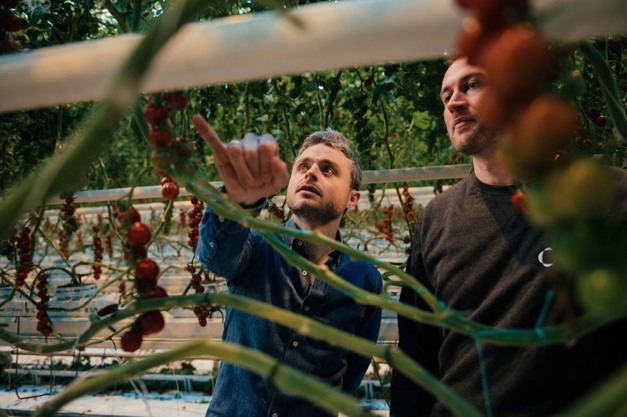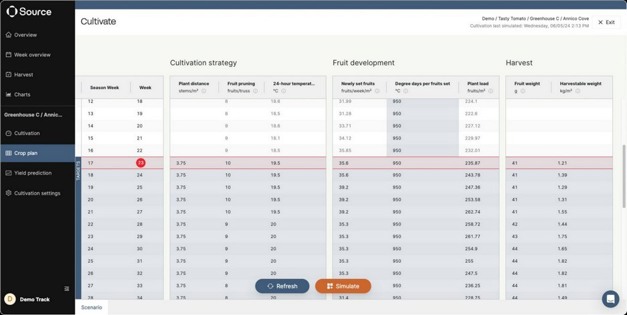"I don't believe in the term autonomous growing." That may sound crazy coming from the CEO of a fast-growing AI company in horticulture, yet it is not. Rien Kamman of Source.ag explains, immediately making another striking statement: "We don't want more, but less screen time for growers."
Autonomous growing does not exist, Rien is adamant. Growing is a profession. In it, a grower has a lot, maybe a hundred or so, responsibilities. What Source.ag wants to do is automate parts of growers' tasks, or support the grower in doing so. That is really different from autonomous growing.

Rien Kamman and Ernst van Bruggen, founders of Source.ag
Lower error rate crop prediction
As an example of a grower's task, he mentions harvest prediction. That is a component where he sees opportunities with AI to make big improvements. Growers have to do this, for their sales organization, and for this they often still work with an Excel document with measurement data, supplemented by the insights from 'a round through the garden.'
"Nine times out of ten, such a prediction three to four weeks ahead goes reasonably well, but a few times a year the grower's prediction is wrong. That's where growers then lose a lot of money, and we can support the grower well with AI harvest prediction." Source.ag developed the Source Cultivate product for this purpose.
Good plant measurements
A prerequisite for good harvest prediction, however, remains good plant measurements. Here, too, Source.ag comes to the aid of the grower with software. The Source Plant App supports the grower in making plant measurements. "That is not AI, but it is software with which we simplify the grower's task, and through this also give the grower the option of delegating the task to someone else."
The topic of crop forecasting shows two examples of products that Source.ag has brought to market. It is not autonomous. "Growing autonomously is too short. It is an expensive word for doing actions automatically. But a grower does so many things at once, I think it is impossible to fully automate."

Harvest forecasting with Source Cultivate is certainly not only reserved for high-tech growers. Rien compares it to Google Maps: cyclists and pedestrians also use it, not just drivers of Tesla cars. Even in less high-tech greenhouses, growers predict the harvest, and Source Cultivate can help them do so. Click here to enlarge the screenshot from Source Cultivate
Decision support
The Amsterdam-based scale-up itself was also almost inevitably about autonomous growing in the beginning, although founders Rien and Ernst also always stressed from the start that they were not going to replace the grower. Still, Source.ag's story is often picked up as such, also because autonomous growing has become a real buzzword.
Rien: "We too were initially more in the corner of autonomous growing. After many discussions with growers, we always concluded that the grower still actually makes all the decisions himself. Who determines the pruning policy, for example? That's the grower. Who decides the planting distance, the 24-hour temperature, and what the intering should be? The grower. But when we then asked what technology they used in those decisions, the answer was that it wasn't there yet. They were asking for help from the neighbor, the crop consultant, or their boss."
Less screen time instead of more
Source.ag's current approach is first to support the grower in executing the optimal strategy. "Instead of autonomously executing the grower's decision, e.g. that the 24-hour temperature should be 21 degrees Celsius, we are now betting on helping the grower ask whether it should be 21 degrees, and not 20 or 20.5. Autonomously implementing a sub-optimal plan doesn't do you much good."
In Amsterdam, they got a lot back in conversations with growers that it is very important for growers right now to have certainty about the harvest and the optimal growing strategy. "That's where they can win euros per square meter. After that, you can take further steps towards autonomous execution." Fully autonomous cultivation is not something Rien sees happening. "There will always still be a human at the wheel."
The grower's job does change. In doing so, Source.ag is developing AI solutions to match those changes. "For example, a next step in Source Cultivate is that we will also add labor and energy." AI should be used for the difficult calculation work, Rien believes. "So that the grower can keep using his green fingers. We don't want more, but as little screen time as possible for growers, so that there is actually more time for those green fingers."
For more information:
Source.ag
[email protected]
www.source.ag
